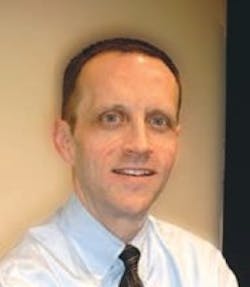The China Currency Coalition, an ad hoc group of U.S. manufacturing, agricultural, and labor groups, including the Forging Industry Assn., recently took the latest U.S.-China trade deficit figures (up to $232.5 billion in 2006, from $201.5 billion in 2005) as an occasion to announce it is promoting legislation in the new Congress to provide protection for U.S. manufacturers who are disadvantaged by the undervalued yuan.
The difference between U.S. and Chinese currencies creates an advantage for manufacturers who produce goods in China and sell them in the U.S. No disagreement about that. "Americans are hurt coming and going," states CCC spokesman David A. Hartquist, "and many U.S. companies have concluded that the only way they can compete is by moving their operations to China. What is needed is legislation that will enable U.S. companies, workers, and farmers— consistent with international law—to defend themselves against the negative impact of undervaluation."
About the unfairness of China's trade policies, I agree. However, the CCC is bypassing an essential point about money, and if this effort is aimed at instituting trade barriers, the currency conflict will become a stare-down: our free-trade principles versus China's managedeconomy techniques. And not very much will change.
But, the investments Hartquist is referring to will find a home — either here, or in China, or wherever it is most welcome. "Most welcome" means "most profitable" to the private investors who direct that money. And, if you haven't already realized it, you should note that private equity is the guiding force of the global economy.
Manufacturing industries are built on consumers' demand, designers' visions, and engineers' skills, but, mostly, they are built on a foundation of fresh capital. Capital is provided by different sources — shareholders, governments, investment bankers, pension funds, mutual funds, hedge funds, and venture capitalists. Today, manufacturing industries, and all market sectors, are being built by the capital (i.e., confidence) supplied by private investors.
Without any question, this has been a good thing for forging companies. Their need for capital is great, too great for most publicly traded companies to make: the return on investment is too long. Governments can't make these investments; their obligations are too broad. Funds, like other stocks, seek returns, and without liabilities. Among all capital sources, only private equity seems to provide what forgers need, and appreciate what they can achieve.
And, the two are succeeding together. KPS Special Situations Fund acquired and is reviving Jernberg Industries, Impact Forge, and Omni Forge. Recently, Citation Corp. decided to sell its forging division, and found a private-equity group happy to take the opportunity. "[We are] the face of 21st-century American capitalism," Carlyle Group co-founder David Rubenstein told Fortune recently: Carlyle is the investor behind Firth Rixson L.L.C.
He'd be more accurate to say they are the face of global capitalism, because the simple philosophy of private equity groups is to place their capital where it will grow — including China, or anyplace there is opportunity. For that reason, anyone worried or outraged by China's currency manipulation ought to recognize that "globalization" is about more than our government policies and philosophies versus those of China, or Brazil, India, or any other foreign manufacturing site. It's about creating opportunities to succeed and grow.
About the Author
Robert Brooks
Editor/Content Director - Endeavor Business Media
Robert Brooks has been a business-to-business reporter, writer, editor, and columnist for more than 20 years, specializing in the primary metal and basic manufacturing industries. His work has covered a wide range of topics including process technology, resource development, material selection, product design, workforce development, and industrial market strategies, among others.
Currently, he specializes in subjects related to metal component and product design, development, and manufacturing—including castings, forgings, machined parts, and fabrications.
Brooks is a graduate of Kenyon College (B.A. English, Political Science) and Emory University (M.A. English.)

